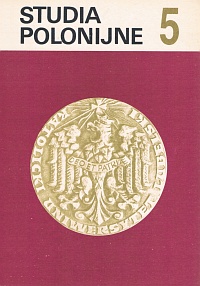Clergymen as ethnical group leaders as exemplified by the activity of priest Franciszek Liss acting in Ruhrgebiet (German coal basin) in years 1890-1894
Main Article Content
Abstract
Polish economical emigration to Ruhrgebiet began after 1871 together with the development of mining industry and industry at all in that region. Emigrants were basically coming from the four eastern provinces of Prussian State: province of Poznań, maritime province of Gdańsk (Western Prussia), Upper Silesia and Eastern Prussia. All of them, with the exception for Mazurian people (in Eastern Prussia), were Catholics. Because their knowledge of German language was poor or none at all, it was necessary to organize for them their own Polish ministry. For a short period 1872/73 in Bottrop and neighbourhood its leader was priest Antoni Kantecki. In the time of Kulturkampf Polish emigrants were deprived of their own ministry. In spite of that some priests from Poznań prowince and maritime provinces were occasionally coming to see their former parish. Priest Józef Szotowski became the first Polish priest in Ruhrgebiet for good. In the time of his five years activity (1885-1890) beside priesthood, he carried on welfare work in Polish organizations. The result of his hard work was the rise of 20 new Polish - Catholic societies. His successor was priest dr Franciszek Liss, also coming from diocese of Chetmno, excellent organizer, social worker, publicist and a most zealous priest. He founded a Scientific Aid Society (Towarzystwo Pomocy Naukowej) under the invocation of St. Jozafat (commonly called Swiętojozafacie). The main task of this society was to create native intellectuals and to educate priests coming from Polish emigrants. Apart from his ministerial activity priest Liss carried also a welfare work in Polish organizations where he held the dignity of a patron. When he left Westfalen in 1894 there were about 60 Polish organizations there. In order to raise the standard of efficiency of the ministry and central control over Polish organizations, priest Liss set up the first Polish magazine of Westfalen and Rheinland - „Polish Old Campaigner” („Wiarus Polski”) (since 1 of January 1891) and a religious weekly „Catholic Messenger” (Catholic Education) i.e. „Poslaniec Katolicki” (Nauka Katolicka) Priest Liss also exerted his strong influence upon Polish emigrants trying to make them realize their nation consciousness which at that time was still feeble, he was also encouraging them to make savings and to come back to the mother country. He laid a strong emphasis on work in the field of culture and education. Thanks to his authority and his organizational powers together with a full commitment to the task he entered upon, priest Liss was for four years a real and the only leader in all spheres of life and he laid the foundations for future energetic development of Polish centre in the west of Germany.
Article Details
References
Brandt H. J.: Das Kloster der Redemptoristen in Bochum und die Polenseelsorge im westfalischen Industriegebiet (1883-1918). „Spicilegium Historicum Congregationis SSmi Redemptoris” 23:1975 H. 1 s. 131-199.
Bredt J. V.: Die Polenfrage im Ruhrkohlengebiet. Leipzig 1909.
Brejski J.: Pamiętnik 50-lecia „Wiarusa Polskiego”. W: Jubileuszowy Kalendarz Wychodźczy „Wiarusa Polskiego” 1890-1940 na rok 1940. Lille 1940.
Chojnacki W.: Bibliografia czasopism i kalendarzy wydawanych w języku polskim w Westfalii i Nadrenii w latach 1890-1918. „Przegląd Polonijny” 3:1977 z. 1 s. 191-200.
Cieślak T.: Pismo polskich robotników w Westfalii „Wiarus Polski” (1890-1923). „Rocznik Historii Czasopiśmiennictwa Polskiego” 11:1972 s. 223-236.
DrygasS.: Czas zaprzeszły. Wspomnienia 1890-1944. Warszawa 1970.
Frejlich J.: Polskie wychodźstwo zarobkowe w obwodzie przemysłowym westfalsko-nad- reńskim. Kraków 1911.
Klessmann C.: Der „Wiarus Polski” - Zentralorgan und Organisationszentrum der Polen im Ruhrgebiet 1891-1923. „Beiträge zur Geschichte Dortmunds und der Grafschaft Mark” 69:1971 s. 384-397.
KlessmannC.: Polnische Bergarbeiter im Ruhrgebiet 1870-1945. Göttingen 1978.
Krasuski J.: Historia Rzeszy Niemieckiej 1871-1945. Poznan 1971.
Liszka J.: Polen in Deutschland 1871-1939. Ein Beitrag zur Geschichte der Seelsorge an Polen. „Priesterjahrheft” Paderborn 1975 s. 26-36.
Łazinka J.: Wierni tradycji: Bogu i Narodowi. „Polak w Niemczech” 50:1972 s. 12-13.
M r o s s H. ks.: Życiorys ks. prałata dra Franciszka Lissa (mps) ss. 2.
MurzynowskaK.: Polskie wychodźstwo zarobkowe w Zagłębiu Ruhry w latach 1880-1914. Wrocław 1972.
P.: Westfalskie Towarzystwo Pomocy Naukowej. „Narodowiec” 68:1977 nr 27.
Szajbel J.: Życie społeczno-kulturalne emigracji polskiej w Niemczech w latach 1870-1914. „Kultura i Społeczeństwo” 15:1971 nr 2 s. 137.
Szotowski J. ks.: O wychodźstwie i włóczędze robotników. „Wiarus Polski” 1:1891 nr 115, 116.
Trzeciakowski L.: Polityka polskich klas posiadających w Wielkopolsce w erze Capriviego (1890-1894). Poznań 1960.
Wachowiak A.: Przedwojenna emigracja polska z Westfalii i Nadrenii jako czynnik unarodowienia. „Niepodległość” T. 7 1933 s. 199-213.
WachowiakS.: Polacy w Nadrenii i Westfalii. Poznań 1917.
Wehler H. U.: Die Polen im Ruhrgebiet bis 1918. „Vierteljahrschrift für Sozial-und Wirtschaftsgeschichte” 48:1961 H. 2 s. 203-235.
Zieliński Z. ks.: Z dziejów „walki o dusze” polskich robotników sezonowych w Niemczech w dobie kulturkampfu. W: Rola Wielkopolski w dziejach narodu polskiego. Poznań 1979 s. 229-239.

